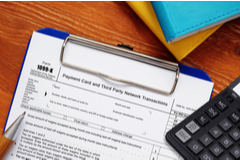Form 1099-K: Definition, uses, and who needs to file
Do you make money through an online marketplace (like Etsy or Poshmark), auction sites (like eBay or eBid), drive for a ridesharing service (like Uber or Lyft), or own a business that accepts third-party network transactions via debit or credit cards? If you answered yes to any of these questions, there is a chance you will receive a 1099-K, a form to report certain payments so you can calculate income tax.

What is a 1099-K?
You may know that there are several types of 1099 forms. The 1099-K form specifically reports payments and transactions from online platforms, apps, or payment card processors. Officially, this tax form is called Form 1099-K: Payment Card and Third Party Network Transactions, which may shed some light on who sends these forms and why.
Note: Generally, apps and online sites should not report gifts or reimbursement of personal expenses from family or friends on a 1099-K as these are nontaxable items.
What is the 1099-K threshold? And what are the latest 1099-K rules?
With the American Rescue Plan Act, Congress changed the tax reporting threshold, determining when third-party networks must issue IRS Form 1099-K. The reportable payment transaction amount was reduced to $600, and the transaction quantity requirement was removed.
Recently, the Internal Revenue Service announced the changes to 1099-K rules have been delayed.
So, what does that mean for the current tax year? For 2023 taxes (2024 filing season), platforms are required to send you Form 1099-K if you had over $20,000 in payments and over 200 transactions during 2023.
The bottom line: If you receive payments for goods and services in 2024 from an app or online platform, keeping your receipts is a good idea.
File with H&R Block to get your max refund
When are 1099-K issued?
Platforms will send your 1099-K by January 31 each year. The form will cover all transactions made during the previous tax year. Depending on the options available from the platform, you may receive the 1099-K electronically or in the mail.
What is a 1099-K used for? What do I do with it?
If you receive a 1099-K form, it generally includes the gross amount of all the reportable payment transactions from the payment processor. The platform or app you used will send two copies of your 1099-K information. One is for you, so you can prepare your tax return. The other will go to the IRS as a record of your payment transactions.
Additionally, it’s good to remember that not all 1099-K transactions are alike, and the tax treatment can vary. No matter what triggers your form, H&R Block can help you with the tax preparation for reporting income from your 1099-K.
Do I have to pay taxes on 1099-K?
This will largely depend on your situation. If you received Form 1099-K for items you’ve sold (like a vintage record or grandpa’s antique watch), goods related to your hobby, or goods or services related to your business, there’s a bit more math and review involved. If you have a business, you may need to include the Form 1099-K amount in your gross receipts. Generally, if you’ve made a profit, it’s possible you’ll owe taxes.
How do I report 1099-K income on my tax return?
How you report the income will depend on why you received it. Here are the 1099-K instructions for a couple of common scenarios.
- Hobby income: You’ll report your gross hobby income on Schedule 1 (Form 1040) and include the Form 1099-K’s issuer’s name and EIN. (Learn more about hobby income.)
- Business income: If you’re a sole proprietor, like an independent contractor, you’ll report the income on Schedule C (Form 1040), line 1, and any returns or allowances on Schedule C, line 2. Additionally, you should calculate the cost of goods sold and report that on Schedule C, line 4. Then, deduct associated business expenses in Part II of Schedule C.
Get help with Form 1099-K
When it’s time to report the information on your Form 1099-K, you won’t have to do it alone. No matter what triggered your Form 1099-K, you can count on H&R Block to help you navigate any income you received, including your self-employed taxes.
Need help sorting out payments sent via third-party payment card transaction sites? Or do you have other income tax questions? Whether you choose to file online or want to file your taxes with a tax professional, we’re here for you.
Was this topic helpful?
